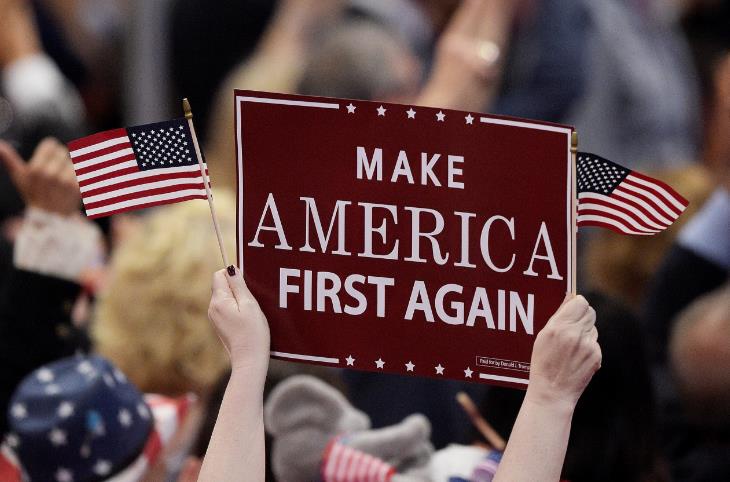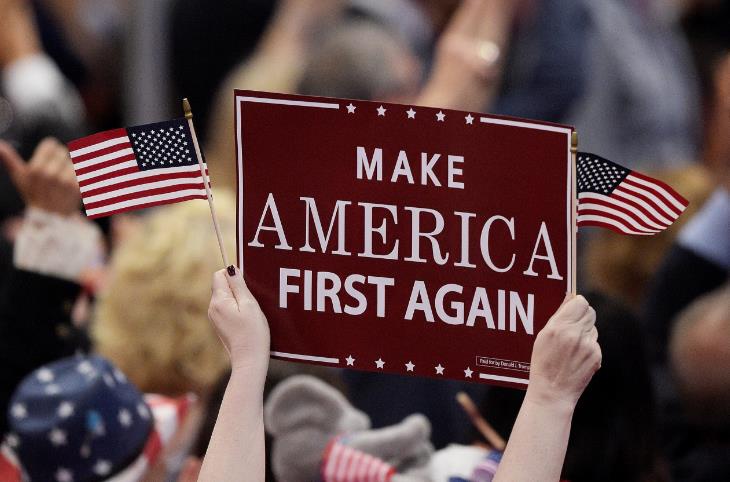By Zhong Sheng, People’s Daily

The slogan of “America First” has been put forward for more than a year, and the speech made by the US President Donald Trump on Jan. 20 of last year is still remembered.
“From this moment on, it’s going to be America First,” the president claimed. “Every decision on trade, on taxes, on immigration, on foreign affairs, will be made to benefit American workers and American families.”
US analysts believe that the slogan which advocates “Americanism” rather than “globalism” suggests that the US has abandoned the diplomatic policies it persisted over the past 7 decades as well as its contract with the world.
After more than a year of observing American diplomatic practice, people have seen the US strides under the slogan “America First”, but the complaints of those Americans who have not felt the benefits of “America First” are piling up.
The US initiated the trade friction, and what comes after the quick thrill can only be recession, as the country is actually firing at itself when pointing the gun to the world.
Even though the US farms are about to embrace a big harvest this year, the Illinois farmer Grede still gets little of the pleasure - the trade war is resulting in a $100 loss per acre for his farm. The US government announced a $12 billion subsidy for farmers wounded by trade war, but the latter could get at most $14 compensation for each acre.
US consumer prices rose 2.9 percent over the past year, a rate last exceeded in late 2011, the US Department of Labor admitted last Friday. Core prices—those outside of volatile food and energy-related expenses—climbed 2.4 percent, the biggest annual gain since September 2008.
The US workers’ weekly wage saw a slight increase of 0.1 percent over the past 12 months, but such performance was achieved by working overtime since they earned less per hour after the deduction of inflation factor.
“Workers are not benefiting from the Trump economy.” That was what the Democratic National Committee concluded in a statement issued last Friday.
The White House may not be interested in the small bills of ordinary US citizens. But the question is, how much patience do the US policy makers have for making scientific calculations, even on the bills at a national level?
To be mad at the figures will not help reduce trade deficits. Washington has to seriously evaluate the supply-demand structures of both domestic and international markets.
The US trade deficits saw the largest increase in a year and a half this June when Washington declared to start the trade war, largely because the prospect of tightened tariffs has forced the US enterprises to import more.
A UK-based macro-economic research institute warned that the trade deficits of the US may go up by $3 billion each month instead of being reduced given the trade war on escalation. Such conclusion has its reasons. After all, the US market has its rigid demands.
Former Chief Economist of World Bank Kaushik Basu has stressed that the complaint of a specific country on trade deficits is as meaningless as one made by a family on its own spending at groceries, barber shops and dental hospitals.
An incredible thing is that it seems the US trade policy makers have all turned deaf, as the voices from industries, international community and professional research institutes never go into their ears.
US entrepreneurs have felt the pain of the “America First” policy at a moment when they are about to lose the giant market of China. “To play the tariff card is not cost-efficient for US economy, since the US only takes a very tiny part on global market, and this is a blow for us,” said a US entrepreneur.
Professor Dani Rodrik of International Political Economy at the John F. Kennedy School of Government at Harvard University believes the US-initiated trade war reflects that “the fever runs highest in the US”.
He reminded that China’s policies have not only generated significant domestic economic growth and poverty reduction, but also created a huge market for western exports and investment.
The US is being ignorant by attacking China because of the trade imbalance, and such practice is also irrational and hypocritical, said David Dollar, who was the US Treasury’s economic and financial emissary to China from 2009 to 2013.
It remains unknown when the trade policy makers of the US will return to rationality, but the side-effect of the “America First” policy has emerged. It will just be a matter of time before the slogan decays.
“From this moment on, it’s going to be America First,” the president claimed. “Every decision on trade, on taxes, on immigration, on foreign affairs, will be made to benefit American workers and American families.”
US analysts believe that the slogan which advocates “Americanism” rather than “globalism” suggests that the US has abandoned the diplomatic policies it persisted over the past 7 decades as well as its contract with the world.
After more than a year of observing American diplomatic practice, people have seen the US strides under the slogan “America First”, but the complaints of those Americans who have not felt the benefits of “America First” are piling up.
The US initiated the trade friction, and what comes after the quick thrill can only be recession, as the country is actually firing at itself when pointing the gun to the world.
Even though the US farms are about to embrace a big harvest this year, the Illinois farmer Grede still gets little of the pleasure - the trade war is resulting in a $100 loss per acre for his farm. The US government announced a $12 billion subsidy for farmers wounded by trade war, but the latter could get at most $14 compensation for each acre.
US consumer prices rose 2.9 percent over the past year, a rate last exceeded in late 2011, the US Department of Labor admitted last Friday. Core prices—those outside of volatile food and energy-related expenses—climbed 2.4 percent, the biggest annual gain since September 2008.
The US workers’ weekly wage saw a slight increase of 0.1 percent over the past 12 months, but such performance was achieved by working overtime since they earned less per hour after the deduction of inflation factor.
“Workers are not benefiting from the Trump economy.” That was what the Democratic National Committee concluded in a statement issued last Friday.
The White House may not be interested in the small bills of ordinary US citizens. But the question is, how much patience do the US policy makers have for making scientific calculations, even on the bills at a national level?
To be mad at the figures will not help reduce trade deficits. Washington has to seriously evaluate the supply-demand structures of both domestic and international markets.
The US trade deficits saw the largest increase in a year and a half this June when Washington declared to start the trade war, largely because the prospect of tightened tariffs has forced the US enterprises to import more.
A UK-based macro-economic research institute warned that the trade deficits of the US may go up by $3 billion each month instead of being reduced given the trade war on escalation. Such conclusion has its reasons. After all, the US market has its rigid demands.
Former Chief Economist of World Bank Kaushik Basu has stressed that the complaint of a specific country on trade deficits is as meaningless as one made by a family on its own spending at groceries, barber shops and dental hospitals.
An incredible thing is that it seems the US trade policy makers have all turned deaf, as the voices from industries, international community and professional research institutes never go into their ears.
US entrepreneurs have felt the pain of the “America First” policy at a moment when they are about to lose the giant market of China. “To play the tariff card is not cost-efficient for US economy, since the US only takes a very tiny part on global market, and this is a blow for us,” said a US entrepreneur.
Professor Dani Rodrik of International Political Economy at the John F. Kennedy School of Government at Harvard University believes the US-initiated trade war reflects that “the fever runs highest in the US”.
He reminded that China’s policies have not only generated significant domestic economic growth and poverty reduction, but also created a huge market for western exports and investment.
The US is being ignorant by attacking China because of the trade imbalance, and such practice is also irrational and hypocritical, said David Dollar, who was the US Treasury’s economic and financial emissary to China from 2009 to 2013.
It remains unknown when the trade policy makers of the US will return to rationality, but the side-effect of the “America First” policy has emerged. It will just be a matter of time before the slogan decays.
 Menu
Menu
 Op-ed: ‘America First’ policy hurts US citizens
Op-ed: ‘America First’ policy hurts US citizens
















